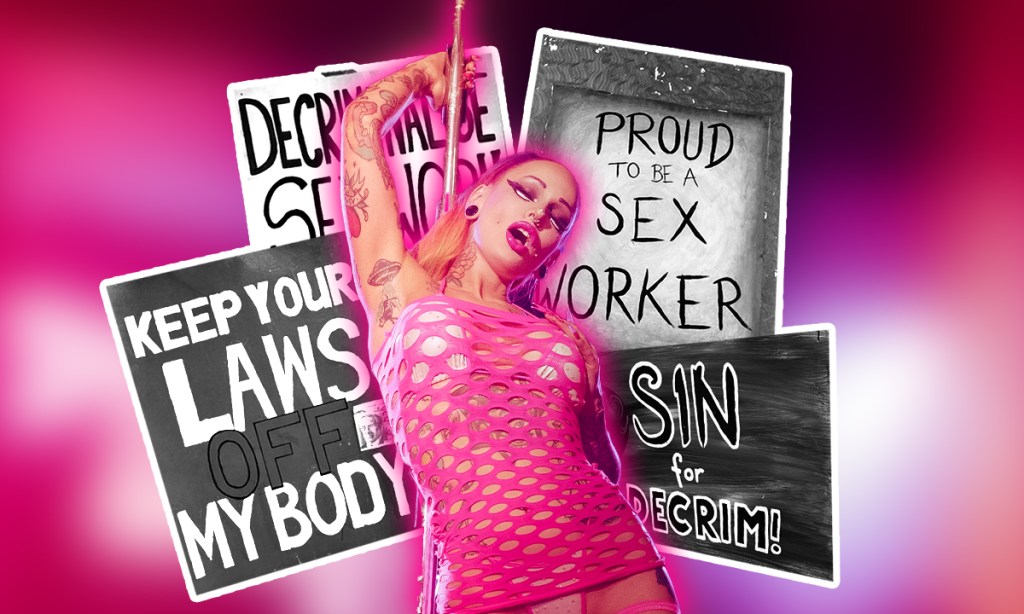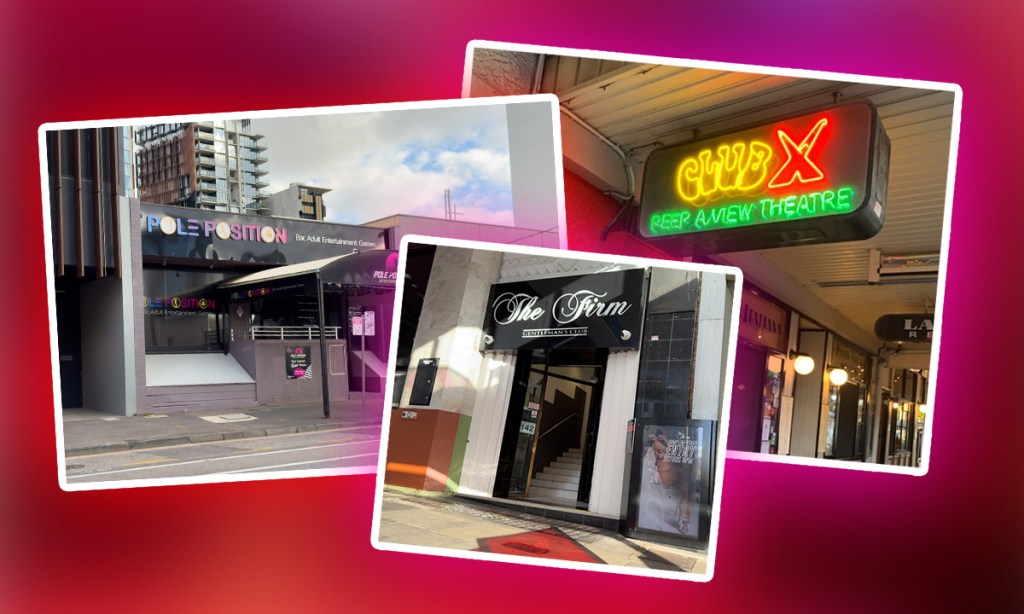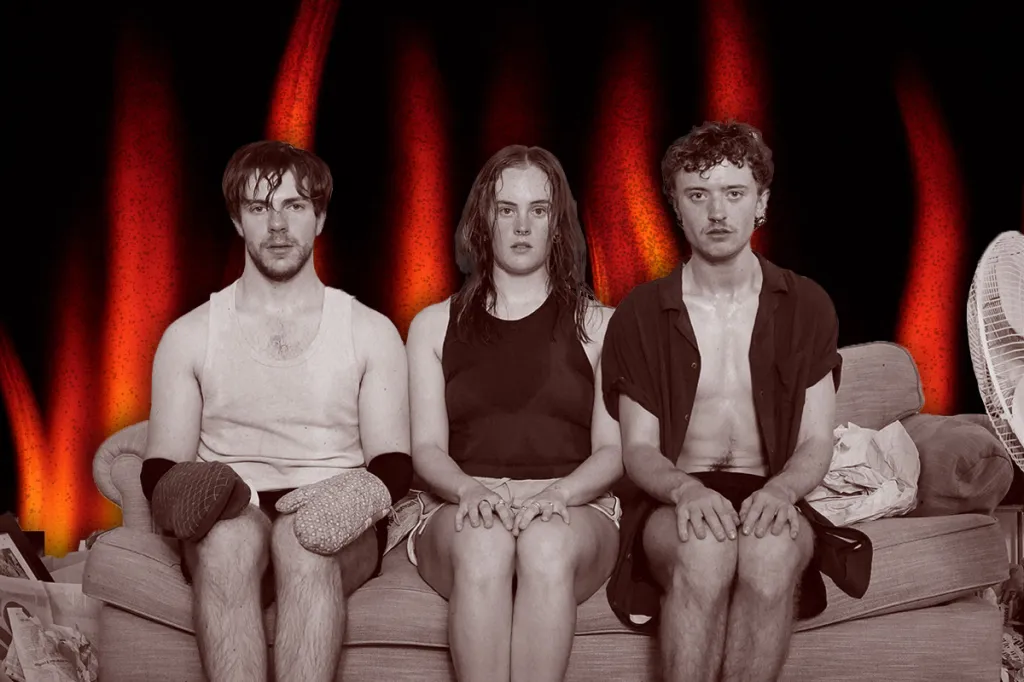New strip clubs and sex shops could be restricted to Hindley Street under a city council move. CityMag deep-dives into what it means and why one group strongly objects.
There are six strip clubs in the Adelaide CBD, only two of which are located on Hindley Street.
Under Adelaide City Council’s proposal to change the planning code, new strip clubs would only be allowed to open up in the Hindley Street precinct, and not within 50 metres of a place of worship, school or childcare centre.
Existing venues will be able to continue operating, with the code only addressing new development applications.
South Australia’s Sex Industry Network (SIN), a community-based organisation promoting the health, rights and wellbeing of South Australian sex workers, say the changes would impact worker choice and safety.

CityMag discussed the code amendments over a cup of tea at SIN headquarters.
SIN general manager Kat Morrison says there’s already a duopoly of ownership of Adelaide strip clubs and the change would hinder future competition and limit worker choice.
“Basically what this does is it takes agency away from workers, and it puts more power in the hands of owner-operators,” Kat says.
“If an owner-operator decides to dismiss you from your place of work, what choice do you have?
“You have really limited choice as to where else you might go to work, and I think it’s really important to point that out because I think a lot of people don’t consider that stripping is actually a career or a vocation.”
Moisty, a peer support worker at SIN and working stripper, says that concentrating strip clubs to Hindley Street would create a known red light district, which poses safety concerns for workers.
“Getting, say Ubers or taxis to and from Hindley Street if that’s known as the red light zone, you’re directly outed or indirectly outed because they know that you’re working in the vicinity of these things,” she says.
“It already can be tedious enough getting transportation to and from work, often I will walk up the street and call my Uber from a different venue so I don’t have to have that conversation, you know?”

This map outlines the proposed planning changes, with the stars marking existing or approved venues. Applications for new venues in the pink and yellow areas must adhere to specific policies and buffer distances. Adult venues can’t be opened in the red and green areas.
The council began a review into adult entertainment venues in August 2023, and at the time it was suggested there had been development applications for venues in locations the council didn’t think was suitable.
You might like
SIN says the amendments were “reactive” to applications for East End strip clubs which they believe to be unfair and shouldn’t result in “a blanket ban on all of us in the future”.
CityMag asked the council if its code amendments were a response to an increase in applications for new adult entertainment venues.
City of Adelaide City Shaping Director Ilia Houridis said “as part of the City’s response to the State Government’s Planning System Implementation Review a number of priorities were identified”.
“For Adult Entertainment, with the introduction of the Planning and Design Code in March 2021, there was a change in the ability to assess applications for adult entertainment premises or adult products and services,” he said.
“These uses were not defined in the Planning and Design Code which made it difficult for Council to identify that a ‘change of use’ had occurred.
“The State Government introduced definitions for adult entertainment and adult products and services in June 2023. This code amendment is seeking to improve policy to assist in the assessment of future applications for adult entertainment premises.”
Defining adult entertainment
The current Planning and Design Code, which was introduced in 2021 and is used to assess development proposals, doesn’t currently include policies on where adult entertainment venues or sex product shops should be located in the city.
In June 2023 the State Government introduced land use definitions for strip clubs, which sets them apart from other businesses under State Planning Commission rules. The definition specifies adult entertainment venues “does not include premises used for prostitution”.
The planning code amendments put forward by the council use this definition, which was determined by the Planning Minister.
Moisty told CityMag this is not best practice language and its use indicated a lack of understanding by policymakers.
“We don’t use that language and I think that that is a huge statement in itself to put that in the code, there’s plenty other ways to word that,” she says.
“Strippers are sex workers, we fall under the umbrella.
“There is a differentiation between full service and stripping but there’s also many, many different forms of sex work, all of them completely valid and they’re all impacted by different levels of legalisation, legal status and discrimination stigma, but it’s important that we are all one community.
“We are all under the red umbrella. It just shows that they are legislating and writing codes on an industry they have absolutely no understanding of.”
Houridis told CityMag “the team notes the comments from the consultation process” regarding best practice language “and will put this forward for consideration”.

Kat Morrison, general manager of SIN advocating for decriminalisation.
Moisty says this wording also implies sex work will always be criminalised in South Australia.
SIN advocates for a decriminalised legal framework, which would remove sex-work-specific criminal laws that apply only to sex workers, their workplaces, clients and third parties.
Under full decriminalisation, sex workers are subject to the same laws and regulations as other businesses and is regarded as the best practice model for the health and safety of sex workers by Amnesty International, the World Health Organisation and the United Nations.
“It also creates future planning issues when, when, not if, decriminalisation does happen,” Moisty says.
The economic landscape
Subscribe for updates
SIN was contacted by the council to submit views on the proposed amendments during the consultation period which closed in late July, but SIN says it had heard from venue owner-operators, strippers and club staff who were unaware of the changes.
“It’s very disappointing that then those directly in the industry and also those who are fighting for industry rights are left out of this process,” Kat says.
“Even if you are an owner-operator of an existing venue, that doesn’t necessarily mean that you don’t want to open a new venue sometime down the track, right?
“So obviously, any new legislation is going to impact any application that you make to City Council to open a new venue so [venue owner-operators] absolutely should have been consulted.”
Houridis told CityMag the owner-operators of all licensed entertainment venues were contacted directly by the City of Adelaide “in accordance with the Council’s engagement plan for the Code Amendment”.
Moisty says these changes feel targeted, and come at a time when sex workers are affected by the cost of living as much as any other industry.
“It feels very targeted and discriminatory towards our industry,” she says.
“We want to be treated the same as any other restaurant or bar or nightclub, any other venue and we believe that it’s fuelled from this idea that it’s dirty or unideal to be located near a strip club.
“We’ve already had the closure of the Land of Promise and Strats within recent times,” Moisty says.
“There are only limited spaces we can work in and we want the option to open new venues and have more working spaces.”

Strats closed in 2023 after 28 years of operating on Hindley Street. The only remaining Hindley Street strip clubs are the Crazy Horse Revue and The Palace. This picture: Tony Lewis/InDaily
The council acknowledged declining nightlife as a threat to the West End earlier this year, but discussions have been predominately focussed on live music venues and nightclubs.
It is also investing $15 million into revitalising Hindley Street, in a move Lord Mayor Jane Lomax-Smith has said will encourage a blend between the entertainment strip’s day and night-time economies.
But SIN finds the plans contradictory and says it points to misunderstandings of how the sex industry operates.
“We’re also really confused about the contradiction between the $15 million investment into turning Hindley Street into a family-friendly precinct, while simultaneously earmarking it as a sub-zone for adult entertainment premises,” Kat says.
“We’re wondering what the Adelaide City Council is thinking in this space, are they trying to draw families during the day and maybe a different cohort during the night?
“And if so, it’s really misguided and it’s misinformed because adult entertainment is not between the times of like 8pm and like 6am, it’s a 24-hour gig.”
Council materials regarding the Hindley Street upgrade don’t specify the term “family-friendly” in its messaging but focus on safety and access with pedestrian-friendly outcomes.
Moisty says she would love to see Hindley Street made cleaner and safer, but that a lot of the messaging for the revitalisation is shrouded in stigma.
“Sex workers deserve to be in clean, safe spaces just like everyone else,” she says.
“It’s like the implication that when they do make it cleaner, safer, upgrade it, that’s not a space that we’re allowed to be in anymore and that’s very unfair. It’s discriminatory.”
“You can have visibility and discretion at the same time and they’re implying that you can’t, that even the acknowledgement that the strip club is within a precinct is a marker on the area.”
Consultation on the planning code amendments has now closed, and the council will summarise feedback and bring it back to a council meeting before it is sent off to the Planning Minister for approval.
Kat says SIN hopes “the Adelaide City Council will hear us, will take our concerns seriously and will be willing to work with the affected populations to ensure the best workplace health and safety outcomes as well as health and well-being outcomes for strippers and sex workers more broadly”.
Houridis says the council is “carefully considering all the submissions made to Council and aim to make a recommendation to Council before the end of 2024”.
SIN, along with the Scarlett Alliance – the peak body representing sex workers – oppose the council’s planning code amendment and are calling on their community to write to their local MPs to oppose the plans.


